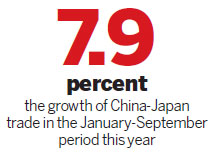China-Japan trade conditions to improve in Q4, say experts
Updated: 2013-10-22 07:24
By Li Jiabao (China Daily USA)
|
||||||||
Some Chinese buyers still refuse to accept Japanese products after rows
Although trade between China and Japan is likely to continue to decline in the fourth quarter of this year, the pace of contraction may ease, experts said on Monday.
"China-Japan economic ties are now at a phase of gradually coming off the bottom and the fall in bilateral trade is likely to slow before the end of the year, mainly owing to sharply contracted trade figures in the same period last year following territorial rows," Yao Haitian, a researcher from the Institute of Japanese Studies at the Chinese Academy of Social Sciences, told China Daily.
"The impact from strained ties continues to hurt bilateral trade but some demand is recovering in the two markets. However, other demand will never regain its position in the Chinese market because some domestic buyers explicitly refuse to purchase Japanese brands," Yao added.
China is growing into the world's largest consumer market and the world's largest trader. The country's imports over the next five years are expected to total $10 trillion.
In the January-September period of this year, Japan was China's fifth-largest trading partner with bilateral trade reaching $229.08 billion, down 7.9 percent from a year earlier, while China's overall trade rose 7.7 percent. China's exports to Japan went down 2.8 percent year-on-year in the same period to $103.91 billion, according to the General Administration of Customs.

Zheng Yuesheng, spokesman of the customs agency, said on Oct 12 that China-Japan trade "showed signs of improvement since the second half of this year" and the monthly trade value narrowed the declining trend for three straight months since July. Meanwhile, China's exports to Japan in September rose 1.5 percent year-on-year, which ended the 14-month decline since July 2012.
Data from Japan's Ministry of Finance showed on Monday that Japan's exports to China in September, Japan's largest trading partner, climbed 11.4 percent from a year earlier after increasing 15.8 percent in August, while its shipments to the United States rose 18.8 percent following a 20.6 percent gain in the previous month and export growth to the European Union eased to 14.3 percent from 18 percent.
Despite the weakened yen, Japan's merchandise trade balance showed a deficit of 932.1 billion yen ($9.5 billion), marking a record 15th consecutive month of trade deficits. Japan's exports in September increased 11.5 percent from a year earlier, the weakest pace in three months, while imports expanded 16.5 percent, the ministry said in a preliminary report.
"Japan's huge imports of energy products were the major reason for the country's trade deficit because nuclear reactors, which once supplied one-third of the country's power, were shut down after the 2011 Fukushima crisis and a weaker currency increased import costs," Yao said.
Zhang Jianping, a researcher from the Institute for International Economic Research under the National Development and Reform Commission, added that the weak yen helped to boost Japan's exports in the short term but the effects of Japan's Prime Minister Shinzo Abe's stimulus measures are ebbing in the medium and long term.
The currency has been under pressure since Abe introduced a monetary easing plan in April. The country's economy grew an annualized 3.8 percent in the second quarter of this year. But the growth is expected to confront headwinds as the Japanese government pressed ahead with a consumption-tax increase, which is crucial to shrinking the huge national debt.
"The ultimate driving force for Japan's economic growth comes from demand from overseas markets, especially China and the US," Zhang said. "China is a very important market for Japan and Japan's dependence on the Chinese market is increasing while Chinese exports' dependence on the Japanese market has decreased in recent years."
Yao added that the strained ties will keep transmitting negative expectations on bilateral trade and mutual investment.
Japan's non-financial investment in China edged up 5.62 percent from a year earlier in the first nine months of this year, compared with the 16.3-percent growth last year, according to the Ministry of Commerce.
lijiabao@chinadaily.com.cn
(China Daily USA 10/22/2013 page13)
 Teacher killed, two wounded in Nevada middle school shooting
Teacher killed, two wounded in Nevada middle school shooting
 Smog wraps northeast, schools forced to close
Smog wraps northeast, schools forced to close
 Architect looks to the big picture
Architect looks to the big picture
 Teachers, students divided over Gaokao reform plan
Teachers, students divided over Gaokao reform plan
 Dogfight looms over jets
Dogfight looms over jets
 Peak season for fall foliage in Beijing
Peak season for fall foliage in Beijing
 Train carrying carrying oil, gas derails in Canada
Train carrying carrying oil, gas derails in Canada
 30,000 turn out in Beijing Marathon
30,000 turn out in Beijing Marathon
Most Viewed
Editor's Picks

|

|

|

|

|

|
Today's Top News
Building a bridge of hearts in the heartland of the US
Li-Medvedev meeting to boost cooperation
China issues white paper on Tibet's development
Hollywood must think bigger about China
Nation witnesses launch of luxury rental businesses
Obama vows to get healthcare website fixed
US OKs Alibaba structure
Economy to see 'good ending' in Q4
US Weekly

|

|







